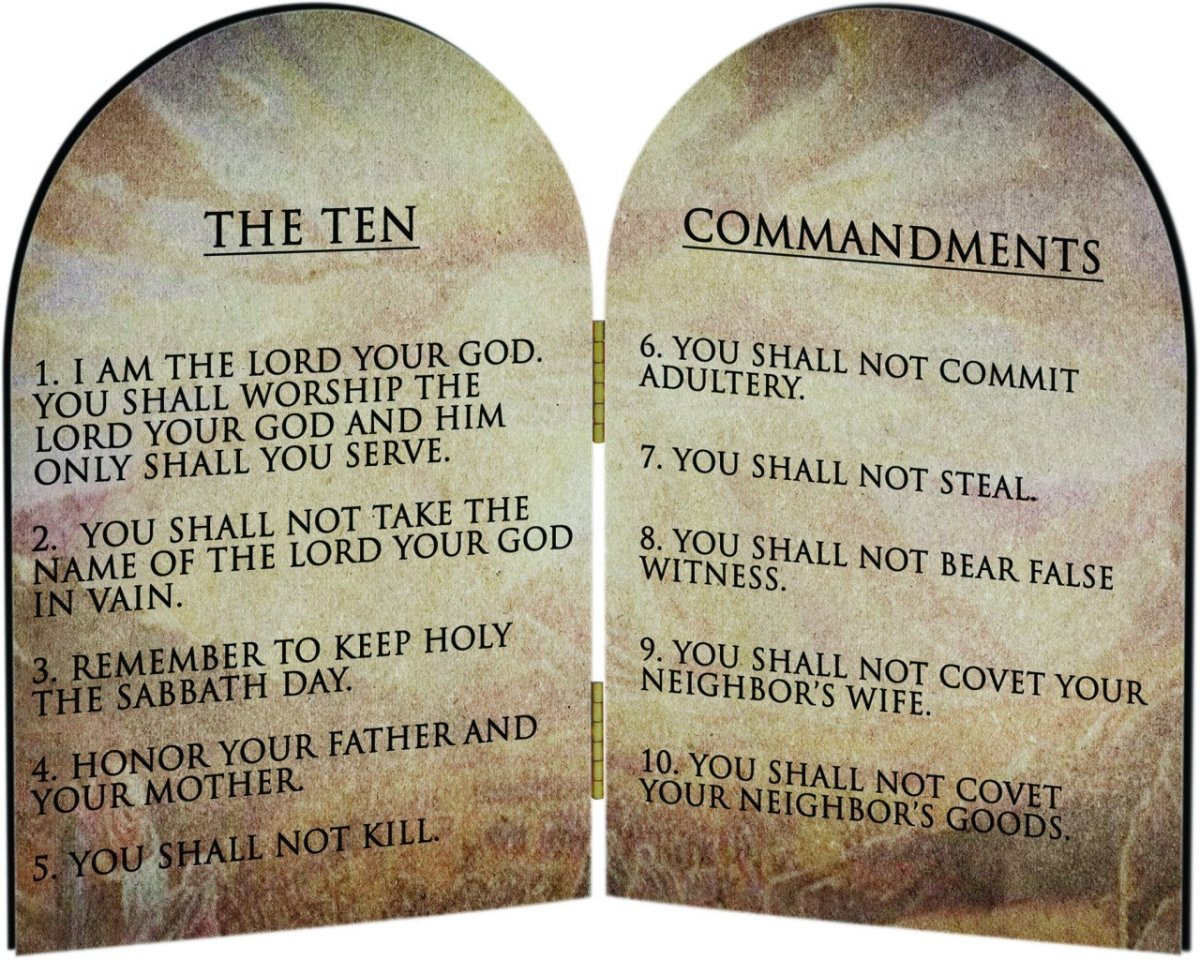Moral Beauty

Matthew 5:17
Think not that I am come to destroy the law, or the prophets: I am not come to destroy, but to fulfill.
How do we determine whether we are going right or wrong? By judgment. Right versus wrong is a conflict that only judgment can help us to resolve. In this writing, by moral law, I am speaking about the Ten Commandments, which are loaded with what the entire world needs to live experientially successful. Jesus said think, give it some thought, that He had not come to abolish the law but to fulfill it. What should our attitude be but to endorse and enforce the law in our own hearts as we follow Him.
Moral law is what gives us the conduct and behavior that pleases God, and assists us in being in His image and likeness. The law was given to Israel, but, it is an universal code of conduct, and a moral endeavor. It is fascinating knowing that the Ten Commandments ended up in America, and were once deemed worthy of observation and implementation. Only an enemy could have sabotaged that effort, because if all would observe them we would have a prosperous society.
----------------------------------------------------------------------------------------------------------------
The following paragraph is taken from ....Steven R. Cook, M. Div. http://www.christonly.com
God gives law to humans living in every age. He gave commands to the first humans living in the sinless environment of the Garden of Eden (Gen. 1:26-30; 2:15-17). He gave commands to Noah (Gen. 6-9). He gave commands to Abraham (Gen. 12:1; 17:10-14). He gave commands to the Israelites—known as the Mosaic Law—after delivering them from their bondage in Egypt (Ex. 20 – Deut. 34). He has given commands to Christians (Rom. 1-Rev. 3). These biblical distinctions are important, for though all Scripture is written for the benefit of the Christian, only some portions of it speak specifically to him and command his walk with the Lord.
-----------------------------------------------------------------------------------------------------------------
In Jesus' encounter with the rich young ruler, the man told Jesus that from his youth he had kept the law, and the Scripture said that, then Jesus beholding him loved him. In this encounter Jesus also ascertains that the man knew the commandments and what they were, and He loved Him for keeping the commandments. This man was rich and Jesus addressed that premise. The root of this conversation began with a question by this man; what shall I do that I may inherit eternal life? The tense is important seeing it was before the cross. You can see that works were important because he asked what must I do. The reality of keeping the Commandments for us today is that they are written in our hearts and not on tablets of stone, although a stony heart can be one's reality as well in observing them.
Mark 10:17-25
17 And when he was gone forth into the way, there came one running, and kneeled to him, and asked him, Good Master, what shall I do that I may inherit eternal life?
18 And Jesus said unto him, Why callest thou me good? there is none good but one, that is, God.
19 Thou knowest the commandments, Do not commit adultery, Do not kill, Do not steal, Do not bear false witness, Defraud not, Honor thy father and mother.
20 And he answered and said unto him, Master, all these have I observed from my youth.
21 Then Jesus beholding him loved him, and said unto him, One thing thou lackest: go thy way, sell whatsoever thou hast, and give to the poor, and thou shalt have treasure in heaven: and come, take up the cross, and follow me.
22 And he was sad at that saying, and went away grieved: for he had great possessions.
23 And Jesus looked round about, and saith unto his disciples, How hardly shall they that have riches enter into the kingdom of God!
24 And the disciples were astonished at his words. But Jesus answereth again, and saith unto them, Children, how hard is it for them that trust in riches to enter into the kingdom of God!
25 It is easier for a camel to go through the eye of a needle, than for a rich man to enter into the kingdom of God.
Can you imagine having kept every commandment from your youth? That is a honorable stance and position to occupy, yet Jesus told him that one thing he lacked, being rich and all, and what He proposed that he do next, grieved him dearly. It is quite reverse today, there are those who have great riches and give what the have to the poor as they follow Jesus, but do they or have they kept the law from their youth? Moral law enriches our lives but it is how you look at it. If your stance for keeping the Commandments is because God deems it important for you to implement and live them and not for goody points, motive would be the determining factor. It is not work, but a path to rest.
Take thou shalt not steal for instance, the prisons would be empty of those who thought stealing was worth while, if their mind could even embrace this truth. Have you ever given it any thought as to how beautiful, pure and excellent moral law is and what it produces? The code of conduct is a cleansing stream. We are living in a fallen world, society and culture? Of which sin has set in motion every and all rebellion, against the knowledge of us knowing, and understanding the Creator, and the commands for living. All of the beauty the Creator intended for us to live in: the moral excellence and abundance desired for us, far surpasses anything that is contrary.
There is beauty in the moral laws given to us by God, that we ignore, because we don't want to be judged by them. Judgment intimidates us, and it shouldn't. If we would allow the law to judge us, we would not be judged, because we are taking responsibility and we realize that there is great counsel in the precepts and principles of the law, which cannot be ignored. Why was the law given? It was given to contrast conduct that is contrary to what is righteous, and to magnify righteous conduct and it was given to judge, correct, and reprove and provide us with excellence and beauty. Moral law produces beauty only the Spirit of God can promote.
The main idea of this hub, is to focus on the contents and context of the Ten Commandments, which represents for and to us the moral law of God; and not the letter of the law that kills, but rather the spirit which grants us life. What would home life be like if the commandments were considered and kept? What quality of children would be raised? How about in schools, government and culture, in every nation, land and region? The prisons would be empty if the commandments were observed and done.
Before there are criminals, there are sinners, and if sin is not dealt with, sinners become criminals. The flesh has proven to us over, and over again that we have fallen from the moral excellence orchestrated by God, but, grace has taught us that through faith in Jesus Christ we are and can be over comers in this life with the knowledge of God's will. God's will is His Word and His Word is His Will and has not, nor shall it ever change concerning what and how He commands that we live. The observance is the acknowledgement, but the doing of it is to practically apply its instructional values for living. Prior to observance, repentance has to be a premiere idea that leads to not just perceiving or observing, but doing the first works. Repentance is a first work for successful enactment of moral law to glean the beauty it produces.
The Ten Commandments are aspects and principles depicting the will of God. It is God that wills we have no other God before Him: it is God that wills we do not worship graven images and idols; it is God that wills that we do not take His name in vain, steal, kill, lie, and covet and that we honor the Sabbath day, and honor our parents, and His will has not changed, the times have changed and people have changed. I ask you this question, is the moral law at work in your life?
The times we are living in have changed, and we are changing, and must change, but God's Word is settled forever in heaven. We are created to be in God's image and likeness, we cannot try to make Him in our image and likeness, it will never work, and then we have replaced Him through idolatry. Idolatry being anything or anyone we put before God, including ourselves.
We didn't create ourselves, how would we know how to live apart from God's patterns. Patterns are a design, model or blueprint for the way something happens or the way something is done. The intent of the moral law was to pattern our lives the way that God ordained that we should live and do things. The knowledge of what and how sin destroyed our passage to life and made our way crooked should alert us to the need for God's way alone. The greatest clue is that we need guidance and order.
We need to see the moral law as a supreme woman-date/mandate for living, as He has written His laws in our hearts, not just on tablets of stone or parchment. The thing about the law written on tablets of stone, the heart can become hardened to observing what is written, which is really for our own good. Written in our heart means it has to pass through a process involving the piercing of our souls. We must reason, we must will, we must emote, we must memorize, we must judge with our consciences, we must form the images and likeness of what the law teaches us and, we must think all things through.
What is a commandment? A command; a mandate; an order or injunction given by authority; charge; precept. What a privilege Moses was given, God entrusted him with the law in its entirety. The Commandments are still speaking today after all of that time, calling for observance, and for the discipline needed in society in keeping them. No, it is not a message you hear everyday, but within your own heart when the reflections of your heart are mirrored in agreement with morals that only the Commandments of God can produce. The Commandments produce a moral standard which meets God's approval.
What does it mean to be moral? The definition was taken from: http://webstersdictionary1828.com
MOR'AL, adjective [
Relating to the practice, manners or conduct of women and men as social beings in relation to each other, and with reference to right and wrong. The word moral is applicable to actions that are good or evil, virtuous or vicious, and has reference to the law of God as the standard by which their character is to be determined. The word however may be applied to actions which affect only, or primarily and principally, a person's own happiness.
Mankind is broken loose from moral bands. The Church is the voice of one crying in the wilderness make straight the way of the Lord, with the morality left in the earth, and if it is not heard, the bricks which have fallen such as morality, can never be rebuilt. The moral law is beautiful and excellent in every way. The Spirit of purity and cleanliness is the magnificence it emanates and it is evidently wondrous. Can you see the glory in adherence to the will of God through the Commandments. It is the voice of judgment that we need in order not to become reprobate and void of judging ourselves and sin. All the children deserve a chance to know and judge what is good and evil from God's perspective. They will make better decisions when they understand. We would understand when we read flee fornication, not just because it is wrong, but because God knows there is pain down the road for all involved, as it is a sin against our own bodies.
We must have a working value system that qualifies God as supreme, His Word, His Spirit and His Will having preeminence over all. In Exodus 20, it tells us that God spoke all the words we know as the Ten Commandments into manifestation. He explained to Israel that He was the Lord God that brought them out of the land of Egypt, and out of the house of bondage. Upon this premise He inscribed, Thou shalt have no other gods before me. In other words, nothing is to be put in the place of God Almighty. What does it mean to have no other gods before Him?

The true treasure of being moral is judgment. As we think, we are always judging in one way or another. The word itself frightens us, yet we do it all the time, because where there are thoughts there is judgment. What thoughts do you have where there is no judgment? If there is no judgment in your mind you aren't truly thinking, you just may be asleep. Recently, I was thinking about the word judgmental and had a aha moment. The word speaks of and is often used for the attitude of one who is judging others. Breaking the word down for myself and to myself, I found it applicable to me, and it is counselling me to judge my own womental condition. What does Romans 12:2 tell us, be not conformed to this world, but to be transformed by the renewing of our minds (change our own thinking) through the process of judgment. How do we decipher between conform and transform, but by judgment. Judgment is a treasure, its misuse comes when we are constantly judging others, not necessarily judging sin.
Morality is the fallen brick from the foundation of society. The bricks are fallen is from Isaiah 9:10. The passage speaks of bricks that are fallen, but the response to that condition was that they would rebuild with hewn stones, in other words with intellectualism and humanism and every ism under the sun, apart from God. What is humanism without morals and standards? God has a pattern which when understood, is experientially applicable, and is the only brick set in place which cannot be moved. It is a merciful act to supply man and womankind with principles for living even when sin wreaks havoc and chaos upon all. He didn't leave the universe without instructions for living in a world where sin is in operation.
Which bricks are fallen? (Moral bricks) What is your answer? Bricks laid correctly produce a sure foundation, bricks inappropriately laid will eventually come loose from the surface and fall. The Bible tells us that the stone which the builders rejected has become the chief cornerstone. This qualifies a sure foundation for building. The Law of Moses, or the law given to and through Moses was a foundational brick consisting of Ten Commandments which when observed and implemented into life produce and erect a moral code by which to live. Why does the law intimidate us? Because it will judge us and we have become anti-judgment, when judgment is really a corrective tool. We need judgment just as much as we need grace. Grace is sweeter than the honeycomb and we should live by and through it because it is by grace, and not the works of the law that we are saved through faith. The law came by Moses, but grace and truth came by Jesus Christ, the only one to ever fulfill the law and cancel all the dread of not observing to do it. We delight that Jesus has met the requirements of God in the earth and has become moral victory we can now see and embrace through His righteousness. Yet does that let us off the hook of activating and implementing the moral demands for success.
The judgment the law expresses is for us to see ourselves in the right light. take the first Commandment for instance, "Thou shalt not have no other gods before me". To those who think the law has been done away with, can we afford to allow this foundational brick of the law to fall? Can we as a society afford not to trust is one God? It is written on our money, in "God we trust". yet the love of money is producing something evil in hearts and an unfavorable, insatiable avarice and greed for it. The rich young ruler is a prime example of what money can do. Tell the truth, who is the God we are said to trust in here in America and are counseled by the commandments not to exalt anything or anyone before. The verse uses the word before me, it is often confused with above me. This is a challenge in a world where money is needed for everything we can possibly need, or desire. The question is do we need and desire God as much as money? That is of course a very difficult question to answer honestly without the Spirit of judgment and the Spirit of Burning.
Judgment exposes desires, intents and motives of our hearts and then we need to be purged and pruned of the dross, thereof burning up dead works. We need a balanced diet or regimen of grace and judgment or we will be unbalanced. We live in and through grace, and grace doesn't produce the reprobate which has no use for judgment, nor does it produce not judging our actions and self. Grace is soooooo good and sweet that we will not want the judgment we need, it is likened to living on desserts from the time you wake up until the time you sleep, all that you partake of the whole time are cakes, pies, cookies, etc., but nothing substantial or needful for good holistic health. Of course, you can see, that is no way to live from a physical standpoint. What about overdosing on grace at judgments expense? Take inventory, from the time you wake up you must use judgment for every task you embark upon, and the grace to accomplish it is there as well. We can't throw judgment away on any level, we are stuck with it no matter what scenario plays out.
The Scripture tells us in Romans 1:27-32 what happens when judgment is ignored, does this sound familiar today?
And likewise also the men, leaving the natural use of the woman, burned in their lust one toward another; men with men working that which is unseemly, and receiving in themselves that recompence of their error which was meet.
And even as they did not like to retain God in their knowledge, God gave them over to a reprobate mind, to do those things which are not convenient;
Being filled with all unrighteousness, fornication, wickedness, covetousness, maliciousness; full of envy, murder, debate, deceit, malignity; whisperers,
Backbiters, haters of God, despiteful, proud, boasters, inventors of evil things, disobedient to parents,
Without understanding, covenantbreakers, without natural affection, implacable, unmerciful:
Who knowing the judgment of God, that they which commit such things are worthy of death, not only do the same, but have pleasure in them that do them.
This passage tells us that God gave them over to a reprobate mind. We are intimated by the word judgment, defenses will rise up rapidly when we hear the word itself, why do we fear judgment, when perfect love casts out all fear. Jesus counseled that if we would judge ourselves, we wouldn't be judged. What is the hindrance of self judgment? We may see some things we do not like about ourselves, but we have access to grace and mercy, then why do we fear judgment? It depends on who is judging. The Word of God is the judge whether we realize it or not, The Holy Spirit is here to reprove the world of sin, judgment and righteousness. We must come to ascertain how imperative law really is and create our value system based on how does God feel about things we value equal or before Him. Only the first Commandment spells it out for us. Is it a realistic endeavor being manifested so that we do not ignore it.
Have you ever beheld the beauty in morality and the excellence it inculcates. Perhaps it was something you admired in others, and you encountered it at your own exclusion. Let's get a working knowledge of morality. What does it mean to be moral or possess morals. To be concerned with principles of right and wrong or conforming to standards of behavior and character based on those principles. Sin set in motion a mind void of the ability to think right in every and all capacities of thought apart from God's Laws which reveal His will.
Every thought we have is threatened by a decision to think wrong, because of the knowledge sin brought with it, or know good and evil. It is our decision to choose the right way to think that will secure moral victories for us. It took great revolve for me to decipher between the right to choose and free will. It was free will that motivated my thinking prior to Jesus Christ. Now it is my right to choose that guides me and inspires me to choose what is right, by the Words of Scripture. There is a guideline for basing all my thoughts. I can ask myself but compared to what? My thoughts versus the Word of God, knowing that God will always be right, and what does that mean for me? That I must be transformed and refuse and reject conformity to any entity that does not uphold righteousness as a valued moral standard. The Law and Commandments of God were given to endow us with morals that are in alignment with the will of God, and not for our demise. How important is it to live morally to you? Please feel free to comment and know that your comments are welcome.
Today it is as though it is believed that we don't need to adhere to the framework or message, patterns or principles inherent in the Law, when we are living through who fulfilled the Law in full. We still have to adhere to those same laws whether we choose to acknowledge it or not. How far can we go without the first commandment today? "Thou shalt have no other gods before me" we can not go far without observing this commandment or we will end up in idolatry, which is spiritual adultery.
Society as a whole is experiencing an onslaught of ideologies that conflict with moral law. Who established moral law? The Creator of the universe has prescribed the method for living in His world by His pattern and principles. Ideologies such as fornication versus marriage, marriage between man and woman vs. same sex unions, How do we determine which ideology is correct? We who believe God and accept the provisions of reconciliation through Jesus Christ base our ideology upon the framework given in Scripture and that is our final authority. God's Word tells us that fornication is not the pattern set up by God for establishing a relationship between man and woman, but marriage is. It is better to marry than to burn in lust for each other, and that takes honesty and maturity.
Most of the time when discussing the Old Testament and the Law, you can be deemed a legalist. When it comes to moral beauty, there is no such thing. There are spiritual garments that we wear, when we exercise the treasures adherent in the law which produces moral beauty. Grace and peace Beloved.








